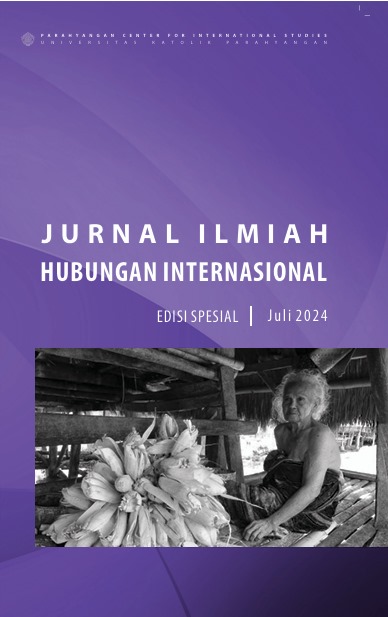Gender-Responsive Policy in Water Management: An Outlook in ‘Citarum Harum’s Program
DOI:
https://doi.org/10.26593/jihi.v1i1.7811.87-104Abstract
In Indonesia, rivers, crucial for clean water, currently face alarming pollution. Unfortunately, women, key in ensuring water quality, lack opportunities. This study aims to depict the state of the Citarum River, women's involvement, and propose ways for women to optimize their role in managing domestic waste for river restoration. Using qualitative methods, the research identifies a connection between environmental issues and patriarchal challenges, emphasizing the need for comprehensive, gender-friendly policies. Recommendations from UN Water policies can be adapted for effective implementation in Indonesia. According to the research, the issue of the environment or water is a component of the traditional patriarchy problem, requiring gender-friendly strategies at all tiers. Even with initiatives to include women in areas such as water empowerment, women continue to be excluded from decision-making processes. Based on the research, it is recommended that women be made aware of their significance in gender-friendly policies and that their opinions should be considered during the decision-
making process.
Keywords: rivers, water quality, women's empowerment
Downloads
Published
Issue
Section
License
Copyright (c) 2024 Jurnal Ilmiah Hubungan Internasional

This work is licensed under a Creative Commons Attribution 4.0 International License.
This journal uses Creative Commons license (CC BY). We allow readers to read, download, copy, distribute, print, search, or link to the full texts of its articles and allow readers to use them for any other lawful purpose. The author must be aware that the article copyrights will be fully transferred to Jurnal Ilmiah Hubungan Internasional only if the article is accepted to be published in the journal through signing of the Copyrights Transfer Agreement. Authors are allowed to resend their manuscript to another journal or intentionally withdraw the manuscript only if both parties (JIHI and Authors) have agreed on the related issue. Once the manuscript has been published, authors are allowed to use their published article under Jurnal Ilmiah Hubungan Internasional copyrights.





